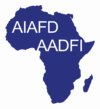Summary Report of the 2024 Annual Workshop
The 2024 Annual Workshop of the Association of African Development Finance Institutions (AADFI) was held on the theme “A practical road map for African DFIs in accessing green funds” on May 27, 2024, from 8:30 am to 12:30 pm in the Kenyatta International Conference Center (KICC), in Nairobi, Kenya. The workshop was hosted by AADFI […]
Summary Report of the 2024 Annual Workshop Read More »








